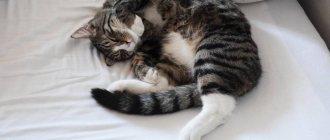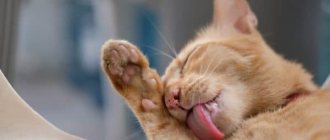It's not entirely clear why cats purr or even how they do it, but you can usually expect your favorite feline to purr when he's feeling content. Purrs are common in cats when they are petted, cuddled in a lap, or sunbathed by a window. Some cats purr simply because they enjoy it. However, cats sometimes purr when they feel bad or in pain.
Therefore, you must pay attention to your cat's mood and physical behavior to determine why she is purring. Moreover, some cats never purr their entire lives, and some cats that once purred stop purring. But why is this? Let's look at why your cat may not purr and discuss what you can do about it.
They just don't like it
Sometimes cats don't purr because they don't want to. But just because your cat isn't purring doesn't mean she's unhappy. It just means they don't want to purr. If your cat usually purrs when you pet her but doesn't purr from time to time, chances are she just won't want to purr at those times. However, if your cat stops purring altogether when you pet her, this could be another reason for the silence.
Image Credit: Paul Hanaoka, Unsplash
Physiological causes of sound
I wonder why cats meow, what motivates them to make such a sound. Zoologists claim that this is determined by the characteristics of the cat’s body:
- The cerebral cortex sends signals to your pet's vocal cords. Electrical impulses force the muscles to contract, thereby causing vibration in the ligaments. If during this process the pet opens its mouth, then a sound appears: “meow,” that is, the cat meows, and if not, then it purrs. Purring occurs due to the bones located under the cat's tongue. During the vibration that occurs in the vocal cords, resonance occurs and a sound comes out, which everyone calls “purring.” In veterinary medicine, these unique bones are called “false vocal cords.”
- Another version of why a cat purrs is a special flow of air that enters the lungs. At the same time, cats purr both when inhaling and exhaling.
- The next assumption is that cats can force blood to circulate through arteries and veins in a special way, resulting in vibration, which is converted into sound in the skull.
- During purring, sound vibration affects the cat's muscles, that is, in the process of purring, not only the muscle mass increases, but also bone tissue grows. Also, for lazy people like cats, purring replaces body exercise.
Interestingly, large relatives of cats are not able to make such a mesmerizing sound, because their light bones are covered with cartilage.
They are sick or injured
A cat may purr to relieve stress when it is sick or injured, but more often cats will stop purring altogether until they feel better. Injury can affect your cat's ability to purr, even if she wants to. Damaged nails, dental infections, and even insect bites can cause injury. Many types of illnesses, from major infections to food poisoning, can cause a cat to stop purring.
If your cat isn't purring due to injury or illness, you may notice other signs of discomfort such as whining, vomiting, and lethargy. You can check for injuries by lightly rubbing your cat's body to see if any area is sensitive to touch. Also examine their mouth and teeth. Any signs of illness or injury associated with a lack of purring should be brought to the attention of a veterinarian immediately.
Why did the cat stop going to the litter box?
The problem is really serious, but not because it is so difficult to solve! Because many cats pay with their lives for people’s ignorance. Often, instead of eliminating the cause of the problem, cat owners begin to consider the cat that began to shit as somehow defective, which is why a lot of pets are actually thrown out to their death on the street, in the countryside... Or they are even euthanized right away! But the problem, although unpleasant, is definitely solvable!
Do not confuse this problem with a situation where a cat is marking territory (yes, cats mark too). If a cat approaches corners or walls, raises its tail and sprays, these are marks. The solution is to sterilize the animal. If you are not a breeder and your cat is not a breeding animal, then you are required to sterilize your pet.
They're just getting old
Sometimes cats lose energy as they age. Instead, they prefer to use their energy for eating and playing. Even though they don't purr, older cats can be just as happy as younger ones. They simply may not have the energy or means to show you their appreciation and happiness as they used to.
Image Credit: Sleepy Cat, Unsplash
Why do cats purr?
The most interesting thing is that it was recently established why and how cats purr. Although in fact they have been doing this their entire adult life.
Causes:
- Most often, such a sound, which is very similar to grunting or rumbling, occurs when the animal has positive emotions. This usually happens when he is stroked or caressed.
- Sometimes this sound appears while eating. But most often, purring occurs in positive situations, when the animal is relaxing.
- It has been noticed that there are some types of anxious purring when the cat is scared, worried or in pain. Accordingly, purring does not always mean that the cat is pleased. Be attentive to the frequency of the sound and its features.
Cat
What to do
There is little you can do about the lack of purring other than provide encouragement to your cat if necessary. If they don't seem normal, you should make an appointment with your veterinarian to see if anything can be done to make them feel better. They may start purring again once they feel like themselves. If your cat just doesn't want to purr, all you can do is love her and reward her with petting and cuddling. If they get old, you may just have to live with the lack of purring from now on, but you can still expect the love and attention you've always received.
Are all cat breeds equally talkative?
Zoologists claim that there are breeds that are hereditarily conditioned to be more “talkative,” and there are others that are the opposite. For example, Cornish Rex, Siamese, and Thai are considered very talkative. Devon Rex and Ragdoll are less talkative. These factors need to be considered before taking a pet into your home.
Regardless, you should enjoy the time you spend with your pet. It’s so nice to pet a purring kitten after an active day. After all, in this way they give us their love and affection.
Final thoughts
Everyone loves to hear their cat purr. The sound and sensation of purring usually confirms the fact that they are happy. But just because your cat isn't purring doesn't mean you're doing anything wrong or that she's unhappy about anything. Watch for signs of trouble, but if you don't see any, chances are your cat just isn't interested. How often does your cat purr and do you notice that she doesn't purr when you expect her to? Tell us about your experience by leaving us a comment!
Posted by Christian Adams An American expat living in Metro Manila, Philippines for over a decade, Christian is a lifelong cat lover and the proud father of two rescue cats, Trixie and Chloe. Both girls used to be among the crowds of homeless people who roam the cities and countryside. Three-year-old Trixie was rescued from a litter found under a neighbor's porch, and two-year-old Chloe was brought home by Christian's young son, Henry, who discovered the crying kitten in the parking lot.
Why does a cat purr?
Of course, everything regarding the question of why cats meow and purr remains only against the backdrop of assumptions and guesses. Here are just some of the common versions of the question why pets purr:
- A way of expressing emotions. This is how the kittens communicate with their mother cat. They seem to tell her that everything is fine with them. This is especially important for a cat family when they are separated for a while.
- Calm. Kittens often purr at the moment when they suck their mother's milk, and the mother cat also calms and encourages them with a similar sound.
- Contentment and gratitude. It is often noticed that a pet, having received its due share of yummy food, makes this mesmerizing sound as a sign of gratitude. The cat is happy with his life and purrs with pleasure.
- Good mood. If the animal is in good spirits, then it seems to hum to itself, rejoicing at the peace and the fact that everything has worked out.
- Purring helps a cat regain its strength after suffering stress. Sound vibrations normalize blood circulation and force the immune system to work in enhanced mode. Thus, the cat warms up at a time when it feels cold, and it calms down after a stressful situation. At this time, he should not be distracted from this activity, as it forces the body’s reserve forces to work.
- When meeting another cat, the pet purrs to show its disposition towards her, its good nature and interest.
- Such a sound can sometimes personify the cat’s cunning; he is able to beg in this way for a tasty treat or affection; sometimes the pet, knowing the owner’s weaknesses, can use purring to ask to enter the owners’ bedroom.
- If the purring is pronounced with an unusual volume, then, most likely, the pet experienced a feeling of fear.
- Sometimes such a sound helps the cat get ready for rest and sleep at night. She seems to achieve peace of mind and harmony.
- If the purr is pronounced with a threatening intonation, then the cat is protecting its territory in a similar way; it is not only determined to protect its home, but also to self-defense.
- The hunter's instinct can manifest itself in a similar way. The cat can purr loudly, following the movements of birds outside the window, as if he is enjoying an imaginary hunt.
Signs your cat is stressed
Stress can be directly related to the fact that your cat has stopped purring. Usually the first sign is the cessation of purring, followed by other symptoms and behaviors that indicate underlying problems.
The problem is that cats are good at hiding pain or emotions because in the wild they would be easy targets for predators. However, stressed cats exhibit a number of common symptoms and behaviors that may indicate that something is wrong.
Stress in cats should be manageable and reduced as much as possible. If your cat experiences too much stress, she may become emotionally and physically unhealthy and may develop illnesses. Some cats also become aggressive, exhibiting unwanted behavior in the home that is difficult to control.
Finding out the cause of your cat's stress prevents a number of problems from getting worse. This will also help you understand why your cat has stopped purring and may help her find her lost voice. Some signs may be difficult to notice, so pay attention to the following:
Physical symptoms of stress
The most common physical symptoms of stress include:
- Diarrhea
- Vomit
- Excessive consumption of food or drink
- Sudden weight loss or gain when the cat eats non-food items such as plastic
- Lethargy or sleeping more than usual
- Dull or oily coat
- Bad, flaky skin
- Bald patches or red sores on the coat due to excessive grooming or reluctance to go to the toilet
- Painful urination with traces of blood
- Cat flu, which is often identified by a runny nose and eyes.
Symptoms may be more severe in cats with chronic illnesses. Stress can also cause recovery from illness to be slower than in a healthy cat, as stress affects the cat's immune system and can make it more difficult for a cat to fight off illness.
Behavioral symptoms of stress
The most common behavioral symptoms of stress include:
- Any significant changes in the cat's daily routine or behavior
- Aggressive behavior directed towards people or other animals
- Accidents all over the house
- Splashing urine on walls or furniture in the house
- Frequent meowing; constant need for attention
- Hides or hides itself in hard-to-reach places
- Lack of understanding of what is happening in the environment
- Nervousness - jumping at every sound or movement
- Reluctance to play
- Prolonged stay outside
- Refusal to go outside
- Excessive grooming, to the point where the skin becomes painful
- Shortness of breath or open mouth
- Excessive movement around the house
- Frequent head shaking
- Squat
- Flatten ears
- exaggerated swallowing
If any of the behaviors listed above seem out of character for your cat, even if they are subtle, it is best to find out the root cause.
How can I reduce my cat's stress?
Managing stress is essential to getting your cat to purr again, so try to figure out what is causing your cat's stress. Once you know this, you can take steps to help your cat feel comfortable again. These tips will also help you:
- Keep your cat healthy by scheduling regular checkups. Don't skip wellness visits and make sure basic treatments, such as flea treatments and nail trims, are completed. These treatments will help your cat feel comfortable.
- Set up many secluded places in the house where your cat can run if she is scared or anxious.
- Play with your cat and change her toys regularly to ensure adequate stimulation.
- Hide treats throughout the house so your cat can get a pleasant surprise.
- Keep the litter box clean at all times and place it in a quiet place where your pet can do its business in peace.
- If you have other animals, make sure they have separate areas where they can get away from each other if necessary.
- Provide access to fresh air.
- Always provide fresh food and water. Hungry and thirsty cats can become grouchy.
The effect of a cat's purring on humans
While it is undeniable that a cat's purrs calm us down, calm us down and make us feel good, their effects don't stop there!
Indeed, cat purring has recently been recognized as having therapeutic benefits for men. This is what some call purr therapy.
In fact, a cat's purring can reduce stress, combat insomnia, and calm anxiety. Other research, for example, is currently exploring the power of purring on bones to speed up bone healing.
When is a Purring Therapy Session Reimbursed by Social Security?
Benefits of “cat songs”
- normalize the emotional state, which is especially useful for owners with nervous disorders;
- strengthen bone tissue and reduce pain;
- improve blood circulation in the brain;
- lower blood pressure or pulse that is too high;
- enhance the regeneration of tissues of the gastrointestinal tract;
- reduce the likelihood of stroke and heart attack.
People who live with furry pets live 4.5 years longer than those who do not have pets. There is also a relationship with allergen resistance. Children who live with a mustachioed pet from birth are less susceptible to respiratory diseases and rarely suffer from asthma.











